golang - 05) TCP Server 만들기
Graceful Shutdown
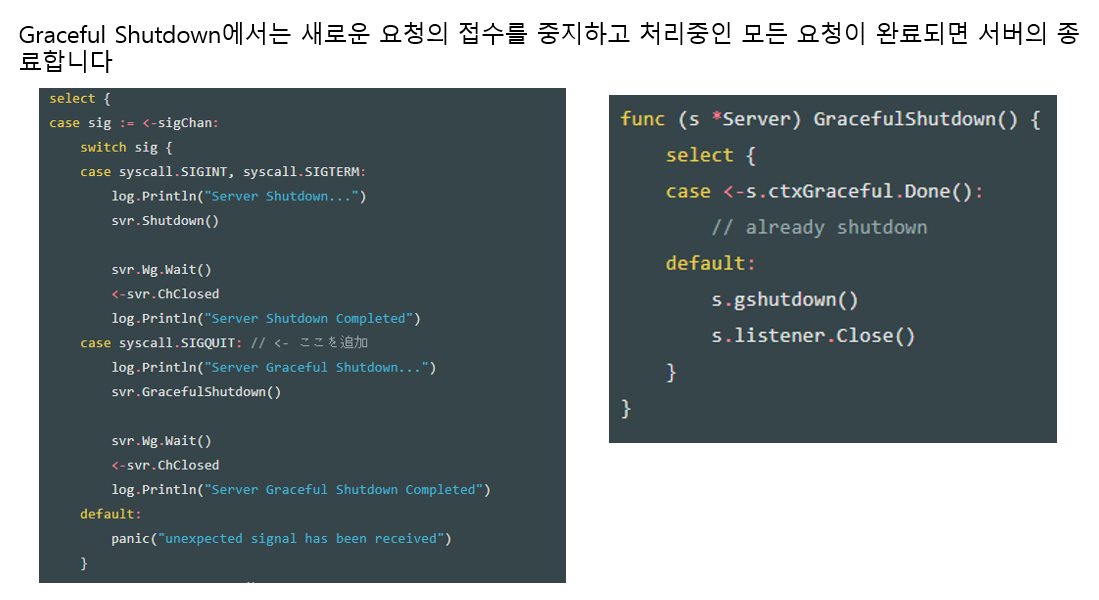
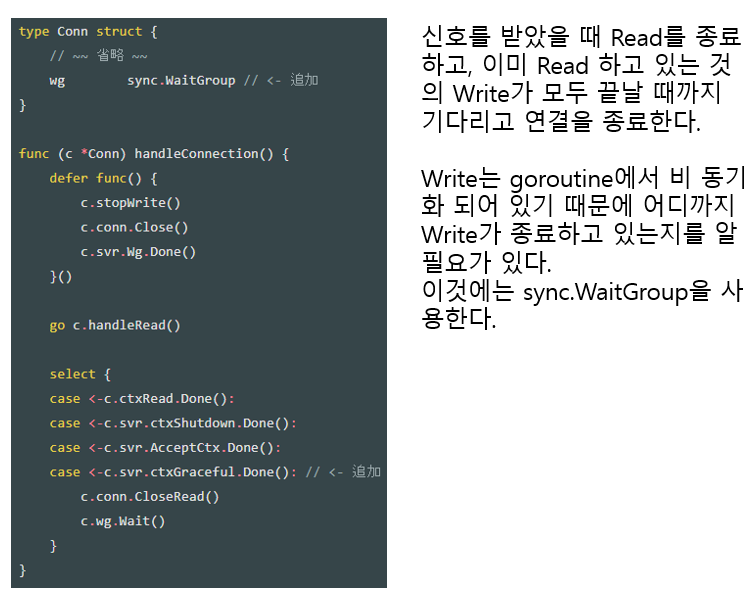
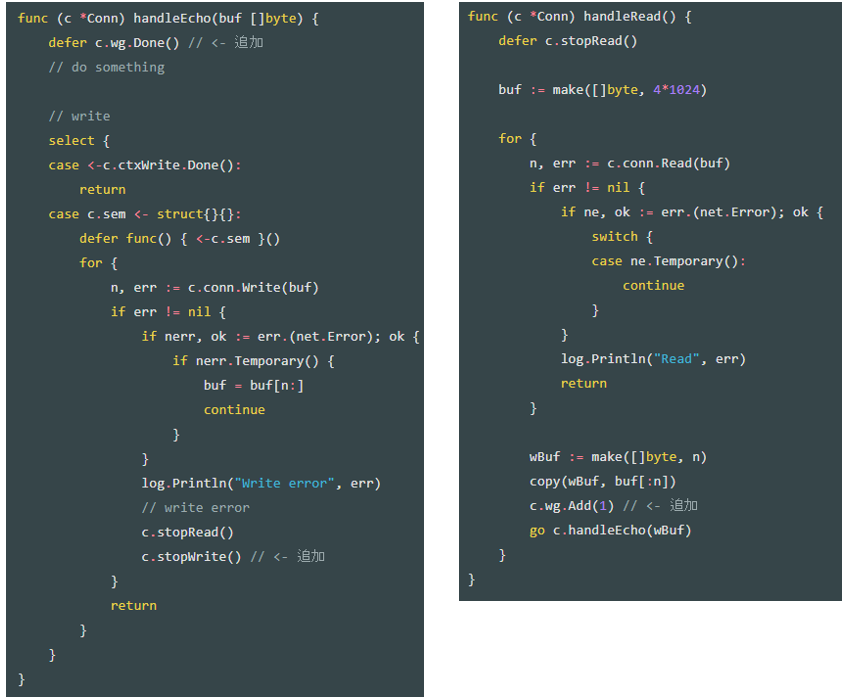
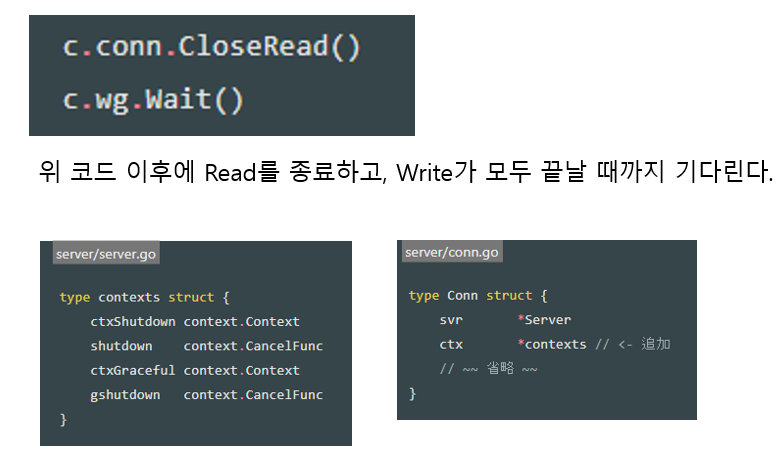
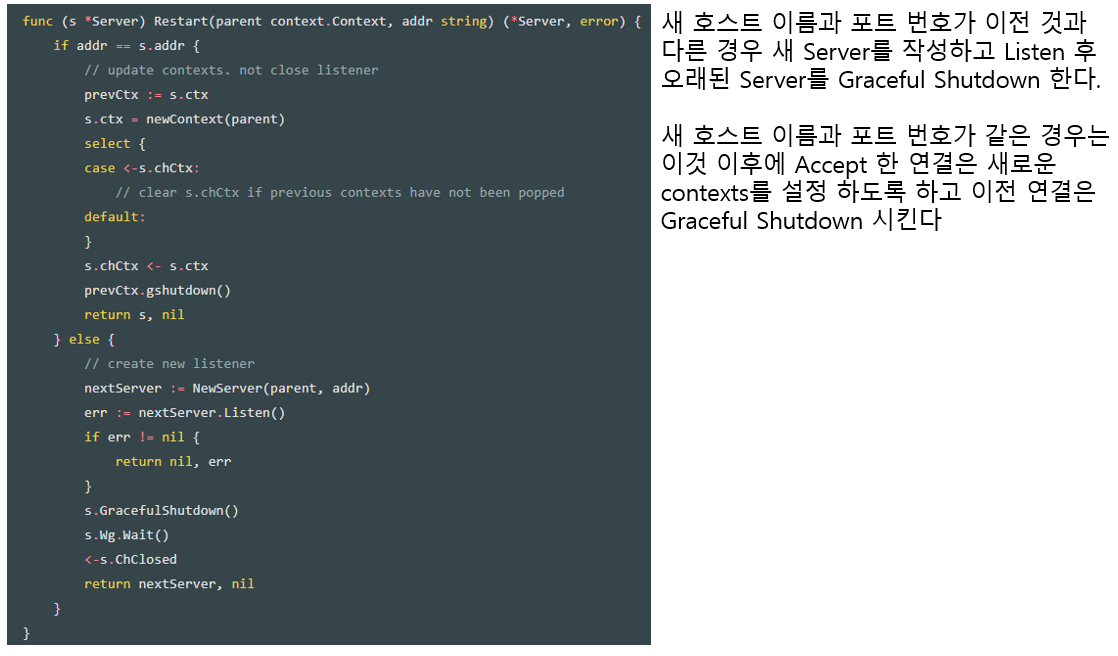
main.go
package main
import (
"context"
"log"
"os"
"os/signal"
"syscall"
"github.com/dmmlabo/tcpserver_go/tcp5/server"
)
func main() {
chSig := make(chan os.Signal, 1)
// Ignore all signals
signal.Ignore()
signal.Notify(chSig, syscall.SIGINT, syscall.SIGTERM, syscall.SIGQUIT, syscall.SIGHUP)
host := loadConf()
svr := server.NewServer(context.Background(), host)
err := svr.Listen()
if err != nil {
log.Fatal("Listen()", err)
}
log.Println("Server Started")
for {
select {
case sig := <-chSig:
switch sig {
case syscall.SIGINT, syscall.SIGTERM:
log.Println("Server Shutdown...")
svr.Shutdown()
svr.Wg.Wait()
<-svr.ChClosed
log.Println("Server Shutdown Completed")
case syscall.SIGQUIT:
log.Println("Server Graceful Shutdown...")
svr.GracefulShutdown()
svr.Wg.Wait()
<-svr.ChClosed
log.Println("Server Graceful Shutdown Completed")
case syscall.SIGHUP:
log.Println("Server Restarting...")
host = loadConf()
svr, err = svr.Restart(context.Background(), host)
if err != nil {
log.Fatal(err)
}
log.Println("Server Restarted")
continue
default:
panic("unexpected signal has been received")
}
case <-svr.AcceptCtx.Done():
log.Println("Server Error Occurred")
svr.Wg.Wait()
<-svr.ChClosed
log.Println("Server Shutdown Completed")
}
return
}
}
var first = true
func loadConf() string {
// TODO: load config from file or env
if first {
first = false
return "127.0.0.1:12345"
} else {
return "127.0.0.1:12346"
}
}
server 패키지
server.go
package server
import (
"context"
"log"
"net"
"strings"
"sync"
)
const (
listenerCloseMatcher = "use of closed network connection"
)
type Server struct {
addr string
listener *net.TCPListener
AcceptCtx context.Context
errAccept context.CancelFunc
Wg sync.WaitGroup
ChClosed chan struct{}
ctx *contexts
chCtx chan *contexts
}
type contexts struct {
ctxShutdown context.Context
shutdown context.CancelFunc
ctxGraceful context.Context
gshutdown context.CancelFunc
}
func NewServer(parent context.Context, addr string) *Server {
ctx := newContext(parent)
acceptCtx, errAccept := context.WithCancel(context.Background())
chClosed := make(chan struct{})
chCtx := make(chan *contexts, 1)
return &Server{
addr: addr,
AcceptCtx: acceptCtx,
errAccept: errAccept,
ChClosed: chClosed,
ctx: ctx,
chCtx: chCtx,
}
}
func newContext(parent context.Context) *contexts {
ctxShutdown, shutdown := context.WithCancel(parent)
ctxGraceful, gshutdown := context.WithCancel(context.Background())
return &contexts{
ctxShutdown: ctxShutdown,
shutdown: shutdown,
ctxGraceful: ctxGraceful,
gshutdown: gshutdown,
}
}
func (s *Server) Shutdown() {
select {
case <-s.ctx.ctxShutdown.Done():
// already shutdown
default:
s.ctx.shutdown()
s.listener.Close()
}
}
func (s *Server) GracefulShutdown() {
select {
case <-s.ctx.ctxGraceful.Done():
// already shutdown
default:
s.ctx.gshutdown()
s.listener.Close()
}
}
func (s *Server) Restart(parent context.Context, addr string) (*Server, error) {
if addr == s.addr {
// update contexts. not close listener
prevCtx := s.ctx
s.ctx = newContext(parent)
select {
case <-s.chCtx:
// clear s.chCtx if previous contexts have not been popped
default:
}
s.chCtx <- s.ctx
prevCtx.gshutdown()
return s, nil
} else {
// create new listener
nextServer := NewServer(parent, addr)
err := nextServer.Listen()
if err != nil {
return nil, err
}
s.GracefulShutdown()
s.Wg.Wait()
<-s.ChClosed
return nextServer, nil
}
}
func (s *Server) Listen() error {
tcpAddr, err := net.ResolveTCPAddr("tcp", s.addr)
if err != nil {
return err
}
l, err := net.ListenTCP("tcp", tcpAddr)
if err != nil {
return err
}
s.listener = l
go s.handleListener()
return nil
}
func (s *Server) handleListener() {
defer func() {
s.listener.Close()
close(s.ChClosed)
}()
ctx := s.ctx
for {
conn, err := s.listener.AcceptTCP()
select {
case ctx = <-s.chCtx:
// update ctx if changed
default:
}
if err != nil {
if ne, ok := err.(net.Error); ok {
if ne.Temporary() {
log.Println("AcceptTCP", err)
continue
}
}
if listenerCloseError(err) {
select {
case <-ctx.ctxShutdown.Done():
return
case <-ctx.ctxGraceful.Done():
return
default:
// fallthrough
}
}
log.Println("AcceptTCP", err)
s.errAccept()
return
}
c := newConn(s, ctx, conn)
s.Wg.Add(1)
go c.handleConnection()
}
}
func listenerCloseError(err error) bool {
return strings.Contains(err.Error(), listenerCloseMatcher)
}
conn.go
package server
import (
"context"
"log"
"net"
"sync"
)
type Conn struct {
svr *Server
ctx *contexts
conn *net.TCPConn
ctxRead context.Context
stopRead context.CancelFunc
ctxWrite context.Context
stopWrite context.CancelFunc
sem chan struct{}
wg sync.WaitGroup
}
func newConn(svr *Server, ctx *contexts, tcpConn *net.TCPConn) *Conn {
ctxRead, stopRead := context.WithCancel(context.Background())
ctxWrite, stopWrite := context.WithCancel(context.Background())
sem := make(chan struct{}, 1)
return &Conn{
svr: svr,
ctx: ctx,
conn: tcpConn,
ctxRead: ctxRead,
stopRead: stopRead,
ctxWrite: ctxWrite,
stopWrite: stopWrite,
sem: sem,
}
}
func (c *Conn) handleConnection() {
defer func() {
c.stopWrite()
c.conn.Close()
c.svr.Wg.Done()
}()
go c.handleRead()
select {
case <-c.ctxRead.Done():
case <-c.ctx.ctxShutdown.Done():
case <-c.svr.AcceptCtx.Done():
case <-c.ctx.ctxGraceful.Done():
c.conn.CloseRead()
c.wg.Wait()
}
}
func (c *Conn) handleRead() {
defer c.stopRead()
buf := make([]byte, 4*1024)
for {
n, err := c.conn.Read(buf)
if err != nil {
if ne, ok := err.(net.Error); ok {
switch {
case ne.Temporary():
continue
}
}
log.Println("Read", err)
return
}
wBuf := make([]byte, n)
copy(wBuf, buf[:n])
c.wg.Add(1)
go c.handleEcho(wBuf)
}
}
func (c *Conn) handleEcho(buf []byte) {
defer c.wg.Done()
// do something
// write
select {
case <-c.ctxWrite.Done():
return
case c.sem <- struct{}{}:
defer func() { <-c.sem }()
for {
n, err := c.conn.Write(buf)
if err != nil {
if nerr, ok := err.(net.Error); ok {
if nerr.Temporary() {
buf = buf[n:]
continue
}
}
log.Println("Write error", err)
// write error
c.stopRead()
c.stopWrite()
}
return
}
}
}
이 글은 2019-05-14에 작성되었습니다.
